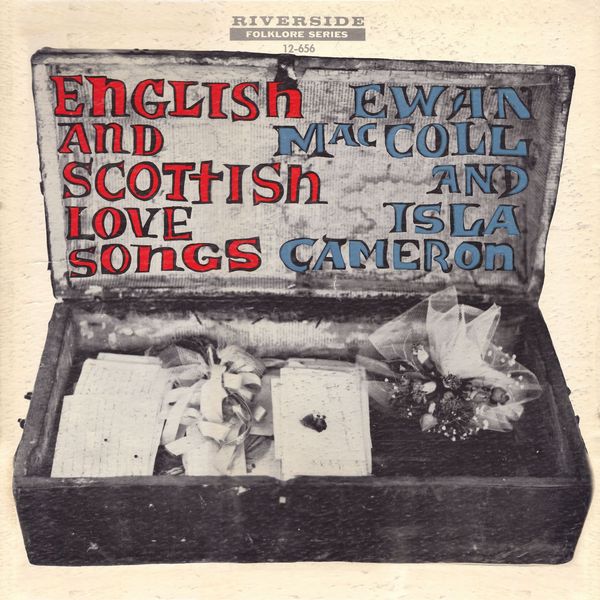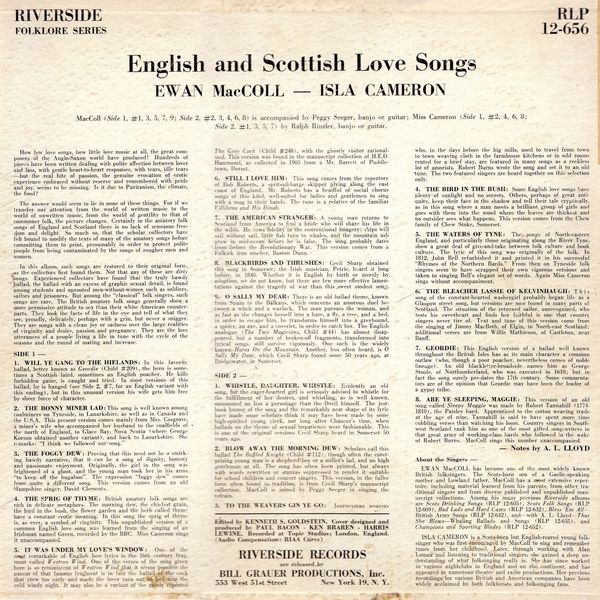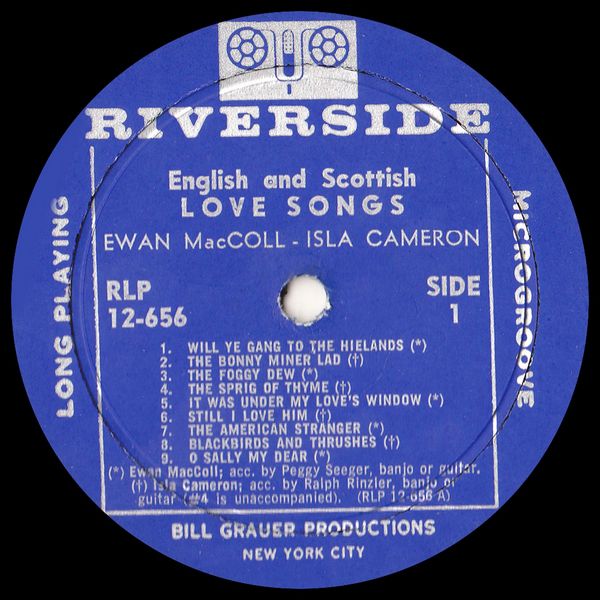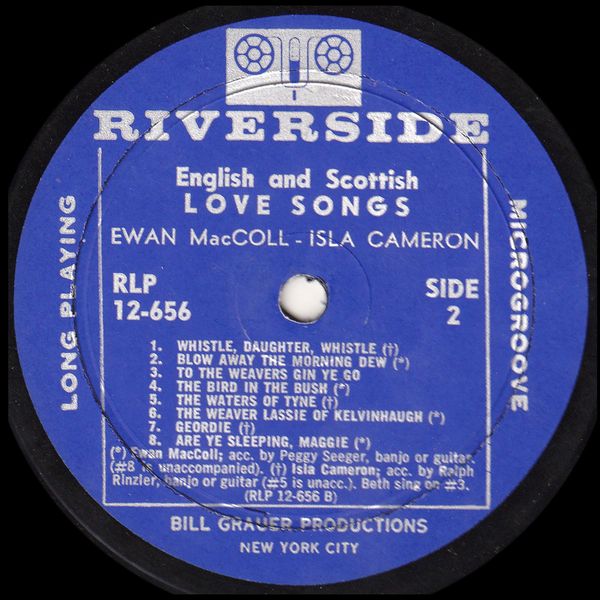

 |


 |
Sleeve Notes
How few love songs, how little love music at all. the great composers of the Anglo-Saxon world have produced! Hundreds of pieces have been written dealing with polite affection between lover and lass, with gentle heart-to-heart responses, with tears, idle tears — but the real bite of passion, the genuine evocation of erotic experience embraced without reserve and remembered with pride and joy, seems to be missing. Is it due to Puritanism, the climate, the food?
The answer would seem to lie in none of these things. For if we transfer our attention from the world of written music to the world of unwritten music, from the world of gentility to that of commoner folk, the picture changes. Certainly in the amatory folk songs of England and Scotland there is no lack of sensuous freedom and delight. So much so, that the scholar collectors have felt bound to modify the texts of many of the amatory songs before committing them to print, presumably in order to protect polite people from being contaminated by the songs of rougher men and women.
In this album, such songs are restored to their original form, as the collectors first found them. Not that any of these are dirty songs. Experienced collectors have found that the truly bawdy ballad, the ballad with an excess of graphic sexual detail, is found among students and uprooted men-without-women such as soldiers, sailors and prisoners. But among the "classical" folk singers, such songs are rare. The British amatory folk songs generally show a more permissive attitude to sex than their white American counterparts. They look the facts of life in the eye and tell of what they see, proudly, delicately, perhaps with a grin, but never a snigger. They are songs with a clean joy or sadness over the large realities of virginity and desire, passion and pregnancy. They are the love utterances of a people living a life in tune with the cycle of the seasons and the round of mating and increase.
WILL YE GANG TO THE HIELANDS —
In this favorite ballad, better known as Geordie (Child #209), the hero is sometimes a Scottish laird, sometimes an English poacher. He kills forbidden game, is caught and tried. In most versions of this ballad, he is hanged (see Side 2, #7, for an English variant with this ending), but in this unusual version his wife gets him free by sheer force of character.
THE BONNY MINER LAD —
This song is well known among coalminers on Tyneside, in Lanarkshire, as well as in Canada and the U.S.A. This present version comes mainly from Mrs. Cosgrove. a miner's wife who accompanied her husband to the coalfields of the north of England, to Glace Bay, Nova Scotia (where George Korson obtained another variant), and back to Lanarkshire. She remarks: "I think we followed our song."
THE FOGGY DEW —
Proving that this need not be a smirking bawdy narrative, that it can be a song of dignity, honesty and passionate enjoyment. Originally, the girl in the song was frightened of a ghost, and the young man took her in his arms "to keep off the bugaboo". The expression "foggy dew" comes from quite a different song. This version comes from an old Hampshire singer, David Clements.
THE SPRIG OF THYME —
British amatory folk songs are rich in delicate metaphors. The morning dew, the chiefest grain, the bird in the bush, the flower garden and the herb called thyme have a constant erotic meaning. In this song the sprig of thyme is, as ever, a symbol of virginity. This unpublished version of a common English love song was learned from the singing of an Irishman named Green, recorded by the BBC. Miss Cameron sings it unaccompanied.
IT WAS UNDER MY LOVE'S WINDOW —
One of the most remarkable of English love lyrics is the 16th century fragment called Westron Wind. One of the verses of the song given here is so reminiscent of Westron Wind that it seems possible the parent of that famous fragment is in fact the ballad of the cock that crew too early and made the lover turn out of bed into the cold windy night. It may also be a variant of the rarely reported The Grey Cock (Child #248), with the ghostly visitor rationalized. This version was found in the manuscript collection of H.E.D. Hammond, as collected in 1905 from a Mr. Barrett of Puddle-town, Dorset.
STILL I LOVE HIM —
This song comes from the repertory of Bob Roberts, a spritsail-barge skipper plying along the east coast of England. Mr. Roberts has a headful of social chorus songs of this kind, well-suited for ladies and gentlemen to sing - with a mug in their hands. The tune is a relative of the familiar Villikens and His Dinah,
THE AMERICAN STRANGER —
A young man returns to Scotland from America to find a bride who will share his life in the wilds. He vows fidelity in the conventional imagery: ships will sail without sail, little fish turn to whales, and the mountain ash grow in mid-ocean before he is false. The song probably dates from before the Revolutionary War. This version comes from a Falkirk iron smelter, Boston Dunn.
BLACKBIRDS AND THRUSHES —
Cecil Sharp obtained this song in Somerset; the Irish musician. Petrie. heard it long before, in 1840. Whether it is English by birth or merely by adoption, we do not know, but there are few more effective lamentations against the tragedy of war than this sweet modest song.
O SALLY MY DEAR —
There is an old ballad theme known
from Spain to the Balkans. which concerns an amorous duel between a witch and a warlock. The man pursues the woman, and as fast as she changes herself into a hare, a fly, a tree, and a bed. in order to escape him, he transforms himself into a greyhound, a spider, an axe, and a coverlet, in order to catch her. The English analogue (The Two Magicians, Child #44) has almost disappeared, but a number of broken-off fragments, transformed into lyrical songs, still survive vigorously. One such is the widely known Hares On the Mountain. Another, less often heard, is 0 Sally My Dear, which Cecil Sharp found some 50 years ago, at Bridgewater, in Somerset.
WHISTLE, DAUGHTER. WHISTLE —
Evidently an old song, for the eager-hearted girl is seriously advised to whistle for the fulfillment of her desires, and whistling, as is well known. summoned no less a personage than the Devil himself. The jest-book humor of the song and the remarkably neat shape of its lyric have made some scholars think it may have been made by some high-spirited young clerk, not long after Chaucer's time, when ballads on the theme of sexual impatience were fashionable. This is one of the original versions Cecil Sharp heard in Somerset 50 years ago.
BLOW AWAY THE MORNING DEW —
Scholars call this ballad The Baffled Knight (Child #112). though often the enterprising young man is a shepherd boy or a millers lad, and no high gentleman at all. The song has often been printed, but always with words rewritten or stanzas suppressed to render it suitable for school children and concert singers. This version, in the fuller form often found in tradition, is from Cecil' Sharp's manuscript collection. MacColl is joined by Peggy Seeger in singing the refrain.
TO THE WEAVERS GIN YE GO —
Journeyman weavers who, in the days before the big mills, used to travel from town to town weaving cloth in the farmhouse kitchens or in odd rooms rented for a brief stay, are featured in many songs as a reckless lot of amorists. Robert Burns wrote the song and set it to an old tune. The two featured singers are heard together on this selection only.
THE BIRD IN THE BUSH —
Some English love songs have plenty of sunlight and no secrets. Others, perhaps of great antiquity, keep their face in the shadow and tell their tale cryptically, as in this song where a man meets a brilliant group of girls and goes with them into the wood where the leaves are thickest and no outsider sees what happens. This version comes from the Chew family of Chew Stoke, Somerset.
THE WATERS OF TYNE —
The songs of North-eastern England, and particularly those originating along the River Tyne, show a great deal of give-and-take between folk culture and book culture. The lyric of this song was originally of the folk. In 1812, John Bell refurbished it and printed it in his successful "Rhymes of the Northern Bards." From then on Tyneside folk singers seem to have scrapped their own vigorous versions and taken to singing Bell's elegant set of words. Again Miss Cameron sings without accompaniment.
THE BLEACHER LASSIE OF KELVINHAUGH —
This song of the constant-hearted washergirl probably began life as a Glasgow street song, but versions are now found in many parts of Scotland. The situation of the returned sailor, unrecognized, who tests his sweetheart and finds her faithful is one that country singers never tire of. Text and tune of this version come from the singing of Jimmy MacBeth, of Elgin, in North-east Scotland; additional verses are from Willie Mathieson, of Castleton, near Banff.
GEORDIE —
This English version of a ballad well known throughout the British Isles has as its main character a common outlaw (who, though a poor poacher, nevertheless comes of noble lineage). An old blackletter-broadside names him as George Stoole, of Northumberland, who was executed in 1610; but in fact the song surely pre-dates the 17th century. Some commentators are of the opinion that Geordie may have been the leader of a gypsy tribe.
ARE YE SLEEPING, MAGGIE —
This version of an old song called Sleepy Maggie was made by Robert Tannahill (1774-1810), the Paisley bard. Apprenticed to the cotton weaving trade at the age of nine, Tannahill is said to have spent more time cobbling verses than watching his loom. Country singers in Southwest Scotland rank him as one of the most gifted song-writers in that great army of working-class bards who followed in the wake of Robert Burns. MacColl sings this number unaccompanied.
— Notes by A. L. LLOYD
About the Singers —
EWAN MacCOLL has become one of the most widely known British folksingers. The Scots-born son of a Gaelic-speaking mother and Lowland father, MacColl has a most extensive repertoire, including material learned from his parents, from other traditional singers and from diverse published and unpublished manuscript collections. Among his many previous Riverside albums are Scots Drinking Songs (RLP 12-605), Scots Folk Songs (RLP 12-609). Bad Lads and Hard Cases (RLP 12-632), Bless 'Em 'All — British Army Songs (RLP 12-642), and — with A. L. Lloyd — Thar She Blows — Whaling Ballads and Songs (RLP 12-635), and Champions and Sporting Blades (RLP 12-652).
ISLA CAMERON is a Scots-born but English-reared young folk-singer who was first encouraged by MacColl to sing and remember tunes from her childhood. Later, through working with Alan Lomax and listening to traditional singers, she gained a deep understanding of what folksinging really is. She has since worked in various nightclubs in England and on the continent, and has appeared in numerous theatre and radio productions. Her previous recordings for various British and American companies have been widely acclaimed by both folklorists and folksinging fans.